(8)(4)_1000.png)
New National Restrictions from 5th November 2020
The following is a summary of amendments to the re-opening of schools guidance. The information below should be used to amend your COVID-19 school risk assessments where required. The following is the link to the latest information. You will see that in various sections this refers to the full re-opening guidance from August 2020.
Face Coverings
Early years settings and primary – No change to guidance, the decision for adults to wear masks is at the discretion of the provider/school management. Children aged 11 or over and adults should wear face coverings when moving around the premises, outside of classrooms or activity rooms, such as in corridors and communal areas where social distancing cannot easily be maintained. Face coverings should also be worn by pupils in year 7 and above when travelling on dedicated school transport to secondary school or college. The decision for adults to wear masks in other areas of the premises would be at the discretion of the provider/school management.
Visitors
Visitors should be restricted to those that are absolutely necessary and cannot be completed by phone or videoconferencing. This means suspending parent and carer visits for; new admissions, settling in sessions and organised sports or performances.
Staff
Those who are clinically extremely vulnerable (received a letter from NHS or GP in the past), should work from home where possible and if this is not achievable should not go into work.
Out-of-hours activities and wraparound childcare
Out-of-school activities may only continue if their primary purpose is providing registered childcare, or where offering other childcare activities, where this necessary to enable parents to work or search for work or to undertake training or education. Out-of-school activities may continue to operate for the purposes of respite care, including for vulnerable children.
Related content
(4)(2).png)
Over the coming months, we’ll unpack key changes, timelines, and practical steps your HR or leadership team in a school or multi-academy trust (MAT) should take now to be ready. In this post, we explain the key employment changes coming into force in April 2026.
.png)
This is a summary taken from Judicium’s DPO ‘Sofa Session’ from the 11th February, with our Data Protection consultant, Shaafah Mohamed. This session explored the use of CCTV within school settings and its link to data protection. Why CCTV is considered privacy intrusive, the legal basis for its use under UK GDPR, and practical steps schools should take to ensure compliance.

This blog is based on Judicium’s Safeguarding ‘Sofa Session’ from the 4th February 2026, with our resident experts Joanne Bocko and Sarah Cook.

This blog is based on Judicium’s Health and Safety ‘Sofa Session’ from the 28th January 2026, with our resident expert Alice Campbell.
(4)(1).png)
The latest ERA implementation explains the imminent changes to trade union legislation, and several things that schools, trusts and colleges should do now to prepare.
.png)
This blog is based on Judicium’s Facilities ‘Sofa Session’ from the 14th January 2026, with our resident expert Joanne Fisher and Neil Merry. This session focused on premises safety, planning day-to-day, and contingency plans for when your caretaker is absent. Practical tips for auditing and ensuring correct regulations and training are in place.

Whats New | HR